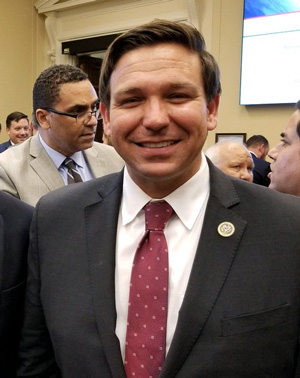DeSantis Pursues New School Voucher Program
February 16, 2019
Gov. Ron DeSantis said Friday he wants to create a new “equal opportunity” voucher program to eliminate a waiting list of about 14,000 low-income students seeking to use state-backed scholarships to attend private schools.
The governor is asking lawmakers to create a “supplement” to the Florida Tax Credit Scholarship Program, the state’s largest voucher-type program, which serves nearly 100,000 students but has about 14,000 others stuck on a waiting list.
“Let’s build on the success … and bring this to another level,” DeSantis said at an appearance in Orlando as he outlined the proposed Equal Opportunity Scholarship program.
 In control of the governor’s mansion and the Legislature for the past two decades, Republicans have consistently sought to expand taxpayer-funded school choice programs. Former Gov. Jeb Bush, who is a national school-choice leader, was quick Friday to praise DeSantis’ decision to “empower students.”
In control of the governor’s mansion and the Legislature for the past two decades, Republicans have consistently sought to expand taxpayer-funded school choice programs. Former Gov. Jeb Bush, who is a national school-choice leader, was quick Friday to praise DeSantis’ decision to “empower students.”
“I applaud the governor’s leadership and look forward to the future where every hard-working family has the ability to choose a school that works best for their children,” Bush said in a statement.
But critics of having another voucher program in Florida slammed the governor’s decision.
“Let us be clear. Vouchers do not create choice for parents, but rather choice for private schools — they can reject students based on economic status, academic achievement, disabilities, English proficiency, immigration status, sexual orientation or even gender,” said Fedrick C. Ingram, president of the Florida Education Association, the state’s largest teachers union.
Since being sworn into office last month, DeSantis has taken steps that have drawn praise from Democrats, such as proposing a boost in environmental spending and seeking to lift a ban on smoking medical marijuana.
The voucher program announcement means the “honeymoon is over,” said Florida Democratic Party Chairwoman Terrie Rizzo.
“It’s clear that Ron DeSantis intends to govern just as the Republican Party of Florida has governed for decades, by selling out Florida families and children to corporate special interests,” Rizzo said in a statement.
DeSantis told reporters on Friday he was aware of voucher backlash, but he praised the educations provided to low-income and minority students through the programs.
“Some people think we should not have the program, but my thing is, look at the results,” DeSantis said. He pointed to statistics that 70 percent of the students served by the Tax Credit Scholarship Program are Hispanic or black.
DeSantis’ proposal will need approval from the Republican-dominated Legislature during the session that starts March 5.
“We’ll be able to wake up in May and say, ‘Wow, we’re taking big, bold action here in Florida on behalf of our school kids,’ ” he said.
The new program in its first year would make scholarships available to about 14,000 students — roughly the same number on the Tax Credit Scholarship waiting list — and then increase by 1 percent of statewide public-school enrollment each year after that, according to information from DeSantis’ office.
Money for the program would come out of the state’s main public-education funding program. That could spur a legal challenge, as a Bush-backed voucher program was struck down as unconstitutional in 2006 by the Florida Supreme Court.
The Tax Credit Scholarship Program is structured differently, with state tax dollars not going directly to the program. Instead, companies can receive tax credits for contributing money to non-profit organizations that, in turn, fund the scholarships.
DeSantis said he wants the new program to provide vouchers that would be similar in amount to the Tax Credit Scholarship Program.
“But it will provide more resources for families to pick the type of education that makes sense for their children,” he said.
In making the announcement at Calvary City Academy in Orlando, DeSantis was joined onstage by parents who support the scholarship programs.
Shereka Wright, a single mother of two boys, said her children were bullied and not doing well in school before going to a private school.
“I chose private school because Simon and Jayden were struggling so much in their public school last year. They were getting Ds and Fs,” Wright said.
Living paycheck to paycheck, Wright said she applied for a tax credit scholarship but was put on the waiting list. She is making tuition payments to have her kids attend a religious private school but said, “I don’t have the money to keep up with the tuition and the school’s patience can’t last forever.”
“There isn’t enough funding for all the families in Florida who need these scholarships,” Wright said.
by Ann Ceballos, The News Service of Florida



Comments